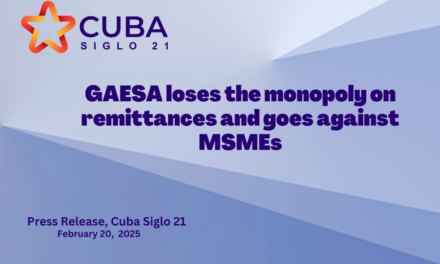Download Complete Report in English
Descargar Dossier completo en español
Ver resumen en español
See Summary in English
December 17, 2024 – The Armed Forces Business Administration Group (GAESA), considered the most powerful economic conglomerate in Cuba, has lost control of the remittance business, according to the recent Dossier “GAESA loses control of remittances”, published by Cuba Siglo 21. More than 95% of remittances sent by the Cuban diaspora now flow through informal networks, displacing the state structures that for decades monopolized this vital sector.
According to estimates by author Emilio Morales, GAESA will close 2024 with only US$81.6 million collected under this heading, equivalent to 4.13% of the total remittances that entered the country in 2023, which reached US$1,972 million. This change evidence a loss of confidence in the regime’s financial institutions and a severe blow to the military elite, which depended on remittances as its second source of foreign currency income.
Factors that precipitated the fall
Among the causes of this debacle is the implementation of the Monetary Ordering Task, a policy that unleashed a deep inflationary crisis and undermined confidence in domestic banks. Also influential were the sanctions imposed by the Trump Administration, which prohibited transactions with entities linked to the Cuban armed forces, such as FINCIMEX. Although GAESA attempted to circumvent these restrictions with the creation of ORBIT, S.A., this strategy failed as it was exposed as a front controlled by the military conglomerate.
The arrival of the COVID-19 pandemic aggravated the situation, closing airports and paralyzing informal remittance channels, while the massive migration wave of more than 850,000 Cubans to the United States between 2020 and 2023 did not generate a significant increase in the volume of remittances either. Instead, new migrants prioritized family reunification, limiting the flow of remittances to the island.
A citizen rebellion from the shadows
The Miami Herald’s investigation corroborates with its own data issued by CORPORACION CIMEX, the research conducted by Havana Consulting Group and published by the Cuba Siglo 21 dossier, which states that there has been a quiet “citizen’s financial rebellion” led by small informal businesses, which has dismantled the state monopoly on remittances. More than 150 “informal banks” in Cuba currently manage these remittances, offering speed and efficiency in the delivery of foreign currency directly in hard currency, at exchange rates more favorable than those of the state.
This phenomenon not only undermines GAESA’s finances, but also reflects a profound change in the country’s economic dynamics. The informal market has almost completely displaced the formal system, consolidating a new reality that, according to experts, will be irreversible in the short and medium term.
A weakened regime
The loss of control of remittances highlights the fragility of Cuba’s financial system and the erosion of its militarized governance. As the informal economy grows, GAESA’s strategies, such as the parcel trade and hotel construction, face internal and external obstacles. Corruption within the regime and repressive tactics against informal competitors reflect a system that is struggling to maintain its survival but appears to be on the verge of its final collapse.
Conclusion
The collapse of GAESA’s monopoly on remittances is not only a financial blow, but an indicator of the deep structural crisis facing the Cuban regime. Growing economic informality and a quiet financial citizen rebellion have transformed the rules of the game, marking a before and after in the relationship between the Cuban people and state institutions.







